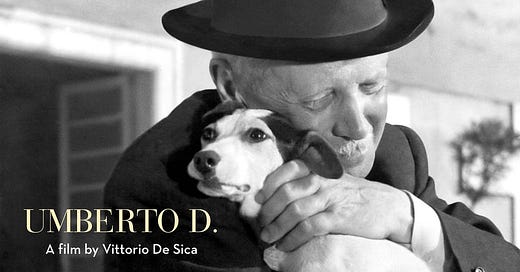If I had written to seek the world’s favor, I should have bedecked myself better and should present myself in a more studied posture. I want to be seen here in my simple, natural ordinary fashion, without straining or artifice; for it is myself that I portray.
—Montaigne, Essays
Somewhere out there is an old man with a laughable pension that can’t even support himself; let alone his impossible-to-hate dog. Some actors spend their whole life modeling themselves to fit an archetype. The square cuts off some of its shape to fit into the peg. The tradition of Italian Neorealism assumes the part and sends the director in search of the actor. The film Umberto D. called for the perfect mixture of the old man archetype.
The failure of this old man cannot be entirely a personal one. In the words of Woody Allen, he showed up for life but success still eluded him. Umberto worked for over thirty years in the ministry but only has a penny pension to show for it. What can you do because of the war or because of the famine or because of the illness? Perhaps Umberto had a wife or a family or a business but you know, that damn war or that damned famine or that illness.
Now Umberto is forced to live with a landlady who wants him out so she can get married. His only friend is the dog, Flike, and the maid. Flike is limited by his existence as a canine to know any better. The maid is limited by life to have any other friends. Where we are in life, is the soil that provides our bedfellows.
Umberto is in a dangerous spot. He needs money and is too proud to beg. There is nothing of the swindler in him. He has survived too long under the mantle of a decent man. With some goading, he may fib to a nun about how much he loves Jesus but he still can’t accept the beggar’s dime. Umberto even prevents Flike from begging when a former colleague recognizes the dog.
In the film, The Graduate, we see what happens when a man past sexual maturity realizes it’s all bullshit and breaks away from the herd. There is still time for Benjamin Braddock to turn left when he should have turned right. I used to think that About Schmidt was the saddest inverse of this scenario. An old man realizing it’s all bullshit at the end of his life has depleted his energy-age battery.
But hey, at least Schmidt had money. He can ride his ride to the last surprise in modern comfort which is comfort unbeknownst to most kings. By comparison, Umberto is worried about finding a place for Flike so he can kill himself in peace. But lo and behold! It seems that every dog boarder in Rome will eat Flike the moment the money runs out. And that damned dog just messes up all your romantic suicide attempts and will just continue to chase you down. What is a man and his dog supposed to do?
What a shock this life must have been for Umberto! You sweat your whole life and then you are just expected to die. And that same attitude that got you through work is the same attitude that prevents you from being an effective vagabond. Umberto is a man looking for the simple dignity of being which he thought he had possessed his entire life.
From this hour I ordain myself
loos’d of limited and imaginary
lines,
Going where I list, my own master
total and absolute,
Listening to others, considering
well what they say,
Pausing, searching, receiving,
contemplating.
Gently, but with undeniable will,
dusting myself of the hold,
that would hold me.
—Walt Whitman, Song Of The Open Road




